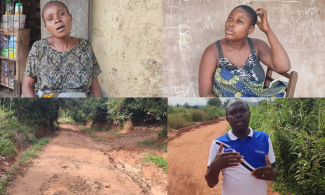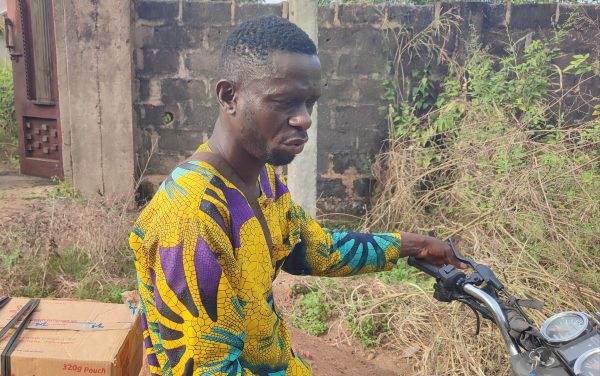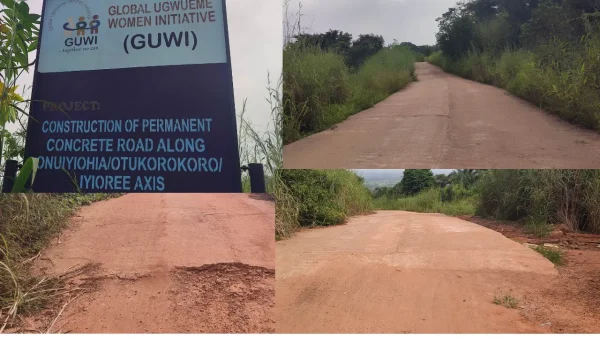
In a remote part of Enugu State, Nigeria, Peace Okonkwo braced herself for the familiar bumpy journey to her antenatal clinic in Awgu town. Though Ugwueme, her village, has a primary healthcare centre, it lacks a doctor to attend to complex cases like her pregnancy.
The Federal Government’s abandonment of a multi-billion-naira road project in Enugu State has taken a serious toll on agriculture and maternal health in Ugwueme. Residents endure hazardous travel conditions to reach healthcare facilities, putting pregnant women, especially at risk. Although a contract was awarded to IDC Construction Limited in 2017, construction has stalled, leaving the community frustrated and vulnerable.
In a remote part of Enugu State, Nigeria, Peace Okonkwo braced herself for the familiar bumpy journey to her antenatal clinic in Awgu town. Though Ugwueme, her village, has a primary healthcare centre, it lacks a doctor to attend to complex cases like her pregnancy. The nearest well-equipped facilities are a few kilometres away, requiring a trip over treacherous, unpaved roads that residents describe as “a nightmare.”
On that August morning, Okonkwo joined others on a bus bound for Awgu, but it wasn’t long before their vehicle got stuck in the mud, halting their journey. After an hour of passengers pushing the vehicle, it finally came loose, but the incident underscored a harsh reality: even routine trips to the doctor can become an ordeal.
“We spent over an hour trying to pull the bus out,” Okonkwo recalls, adding that her journey was “always filled with bumps, stops, and discomfort.” For years, Ugwueme’s residents have had no choice but to brave these challenging roads, especially women like Okonkwo who face repeated delays and exhaustion when trying to access healthcare.
Yet this story is not just about poor roads; it’s about a community held hostage by broken promises. In 2017, the Federal Ministry of Works awarded a N14.6 billion contract to IDC Construction Limited to connect Ugwueme and surrounding communities in what was intended as a life-changing project, Theinvestigator probe revealed.
The 36-kilometer road, spanning Ugwueme, Nenwenta, Nkwe Ezere, Awgunta Obeagu, Mgbidi, and Nmaku, was supposed to end years of isolation for these communities. For the residents of Anike land, this multi-billion-naira project represented a promise of smoother journeys, better access to healthcare, and, ultimately, a brighter future.
However, residents are still waiting years later, as the project remains largely abandoned.
The Broken Promise
Initially, the news of the road construction had brought hope and excitement to Ugwueme. Many residents, like President-General of Agulese, Sunday Okafor, believed it would finally mark the end of their community’s longstanding struggle with poor infrastructure. But as the years rolled by, hope faded. Residents began to wonder if they had been forgotten again.

According to Frederick Okeke, a local leader in Ugwueme, IDC Construction arrived shortly after the contract was awarded in 2017. The contractors conducted a survey, raising community expectations that construction would soon begin. However, the work started from the opposite end, in Nmaku, and only progressed eight kilometres before abruptly stopping at Obeagu. Okeke and other community leaders say that was the last they saw of the company.

Part of the road completed in Obeagu with one-sided drainage.
Blame And Broken Roads
When asked why the project stopped, IDC Construction claimed that the Ugwueme community had demanded compensation for crops and buildings along the road. This, they explained, led the government to reroute the project to avoid inhabited areas, opting to build in areas without homes or farmland to bypass compensation.
However, the residents tell Theinvestigator a different story. “At no point did the community insist on compensation,” Okeke said. According to him, federal surveyors had visited and informed residents that they might receive compensation, but no demands were made. Okeke said the community had even marked their buildings with “Not Affected” inscriptions to reassure the government that they would not hinder the project. Their primary goal, he said, was to see the road built.

Without this essential road, residents must often trek long distances to avoid the most impassable stretches or detours through neighbouring Isuochi in Abia State, a risky endeavour on poorly maintained motorcycles. In the rainy season, travellers endure slippery, muddy roads, and during the dry season, the terrain becomes a maze of potholes and deep cracks.
Many residents, like Okorie Chioma, describe coming back from these trips as exhausting, sore, and in need of pain relievers to cope with the physical strain.
A Community In Decline
The incomplete road project has impacted every aspect of life in Ugwueme, from healthcare to business to education. Many local women report missing medical appointments because of travel difficulties. Okorie Chioma, a resident, recalls returning from the market with bags of food, only for her car to get stuck on the road. When she finally made it home, her husband was outside, worried about her delayed return. “It took us hours because we had to keep stopping to avoid bad spots,” she remembers. “When I got back, I was too sore to sleep,” she added.
Travel costs have soared as motorcyclists, the primary mode of transportation, charge high fees to navigate the rough terrain. What would be a brief drive on a good road now takes time and a steep price. Going from Ugwueme to Awgu town can cost between N2,000 and N2,500 while reaching Newenta costs up to N3,000 — fees that are prohibitive for many.

Nwabueze Ifeanyi says he has fixed his motorcycle tyres severally.
But TheInvestigator inquiry shows that the effects of the abandoned road project stretch beyond the immediate inconvenience. Ugwueme and its neighbouring villages, known for their rice, cocoyam, cassava, and palm oil, struggle to move goods to market. Farmers are forced to carry produce on their backs, and perishable goods often spoil before they reach buyers.
Many businesses that once operated in the community have shut down, and traders from other communities, like Isuochi, no longer visit. Okafor described this situation as “a terrible economic waste,” noting that perishables are thrown away regularly due to transportation obstacles.
Women Taking The Lead
Frustrated with government inaction, the women of Ugwueme decided to take matters into their own hands. Through the Global Ugwueme Women Initiative (GUWI), they began monthly contributions, raising over N50 million since 2019. Their funds have helped make portions of the road temporarily passable, with about one kilometre patched with concrete asphalt.
“We contribute as low as N200 each,” says Uzoamaka Ogor, GUWI’s spokesperson. “We’ve received support from our daughters abroad and those here at home, and this effort has been ongoing for years. We cannot keep waiting for the government,” she told TheInvestigator. But even Ogor acknowledges that their efforts are unsustainable. Each rainy season, the repaired portions suffer new damage, creating potholes that hinder travel once again.

Road constructed by Global Ugwueme Women Initiative (GUWI).
The broader community has also pooled resources, raising N1.5 million to grade certain sections of the road. But they know these are only temporary solutions. Without government intervention, they fear the repairs will amount to little more than a band-aid on a wound that needs real healing.
A Project Stalled
Since IDC left the project site in 2021, the company claims it cannot return without receiving the N1.3 billion owed by the federal government. According to Okeke Anderson, spokesperson for IDC, their hands are tied. “We cannot return to the site without money,” he said, noting that the cost of materials and labor has surged since the contract was signed. “Back then, a layer of asphalt cost N3,700 per square meter. Today, it costs over N30,000. Without an updated contract to reflect these costs, no work can continue.”
The contract for the 36-kilometre road project was awarded at N14.6 billion. GovSpend data reveals that between December 2018 and September 2024, IDC Construction Ltd received 10 payments totalling N2.5 billion for the project.
In August 2023, Works Minister David Umahi visited the project site, giving residents hope that action might finally follow. He promised that funding issues would be addressed and urged contractors to return to work. “The availability of funds will not be a challenge,” he assured the community. “I will ensure the money is paid,” he reiterated.
But a further probe by TheInvestigator shows that as of November, no funds have been released, and the project remains dormant. A civil engineer with the Federal Ministry of Works, who spoke anonymously, echoed the financial concerns. He pointed out that contract rates are outdated, making it impossible for IDC to resume work under the current terms. “You can’t expect a company to work at a loss,” he said, adding that the government’s slow funding is a recurring issue for infrastructure projects in Nigeria.

Hope, Deferred
Ugwueme’s road remains a striking example of the impact of stalled infrastructure on rural communities. The people of Anike land have waited for decades for this road, believing that it would bring transformation and hope. For now, though, that hope remains just out of reach, another promise unfulfilled.
As the dry season approaches, the residents brace themselves for another round of temporary fixes. The women of GUWI plan to hire a bulldozer to grade the road and make it somewhat passable. But they are fully aware that these fixes are temporary. “It’s not sustainable,” Ogor admits. Adding that “This road needs proper construction.”
This report was published with the support of Civic Media Lab.